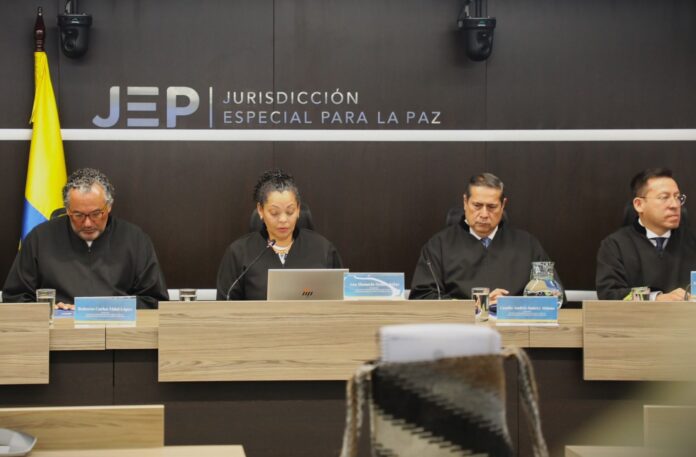
In its second ruling, the JEP court in Colombia convicted 12 military personnel for the so-called “false positives.” Credit: @JEP_Colombia / X.com.
In its second ruling, Colombia’s Special Jurisdiction for Peace (JEP), the transitional justice tribunal, handed down a sentence of between seven and eight years to the military personnel responsible for 135 extrajudicial executions, known as “false positives,” crimes previously acknowledged by those now convicted.
After this tribunal issued its first ruling last Tuesday against the last leadership of the defunct FARC guerrilla for nearly 22,000 kidnappings committed during the armed conflict, the decision was awaited in this case of restorative justice against military officers responsible for war crimes and crimes against humanity.
In total, 4,222 people have been accredited by the JEP as victims in cases of forced disappearances or killings grouped under the “false positives” nationwide, and 22 former servicemen admitted responsibility for these crimes, although only 12 soldiers belonging to the La Popa Battalion in Colombia’s Caribbean region were tried in this proceeding.
Those convicted must now work on six memory projects ordered by the tribunal, aimed at remembering the harm caused. These projects range from building a mausoleum for the victims to assisting in the creation of memory sites for local Indigenous peoples, the main victims of these crimes.
Colombia’s JEP issues second ruling against military over ‘false positives’
On Thursday, Sept. 18, Colombia witnessed the second ruling in the history of the JEP tribunal. Following the conviction of former FARC commanders issued last Tuesday, today the tribunal announced its sentence against 12 military officers involved in extrajudicial executions committed between 2002 and 2005 in cases known as “false positives.”
The soldiers who admitted taking part in these acts, considered crimes against humanity, received sentences of between seven and eight years, very similar to those imposed on former guerrilla leaders for crimes also committed during the Colombian armed conflict.
As a symbolic act, Judge Ana Manuela Ochoa, president of the JEP’s Chamber for the Acknowledgment of Truth, placed the lengthy ruling inside an arhuaca mochila, a traditional bag of the Wiwa people of the Sierra Nevada, who are among the victims of the Caribbean Coast sub-case within Case 03.
It should be recalled that this tribunal is part of the transitional justice system, and its rulings are restorative rather than criminal in nature, meaning the 12 convicted men will not serve prison sentences, just like the former FARC leaders sentenced earlier this week. However, it is worth noting that, in addition to those convicted today, there are three other soldiers who did not acknowledge their participation in the acts and must therefore face a separate trial.
ATENCIÓN: La JEP sancionó por 8 años a los 12 integrantes del Batallón la Popa, responsables de asesinatos y desapariciones forzadas presentadas ilegítimamente como bajas en combate en la Costa Caribe. Es la sanción más alta prevista en el Acuerdo Final de Paz. pic.twitter.com/QPkBeCGESR
— Jurisdicción Especial para la Paz (@JEP_Colombia) September 18, 2025
The military acted with the collaboration of paramilitaries
The ruling establishes that the convicted soldiers acted in clear collusion with paramilitaries to carry out their criminal plans, in acts committed in the departments of Cesar and La Guajira, in northern Colombia.
The document notes that, broadly speaking, the criminal dynamic in these cases followed the same pattern: paramilitaries identified victims based on certain traits or general characteristics and handed them over to the military, who then presented them as combat kills.
The reading of the ruling, led by the judges of the JEP’s Chamber for the Acknowledgment of Truth, began with remarks by Judge Alejandro Ramelli, who emphasized the significance of this Caribbean sub-case of “false positives,” given the ethnic identity of the victims.
“We cannot fall into historical denialism — these crimes did occur,” said the president of the transitional justice tribunal, referring to these cases that involve the state in killings committed by the armed forces during the presidency of Alvaro Uribe.
Ramelli stressed the importance of truth and reparation, which are core principles of this type of transitional justice. “With this ruling we do not intend to erase your suffering, but we must persist in confronting denialist and hateful discourse. We trust that the light of truth will prevail, that this judicial process will bring some solace to your pain. We recognize and dignify the victims,” he concluded.

See all the latest news from Colombia and the world at ColombiaOne.com. Contact our newsroom to report an update or send your story, photos and videos. Follow Colombia One on Google News, Facebook, Instagram, TikTok and subscribe here to our newsletter.


